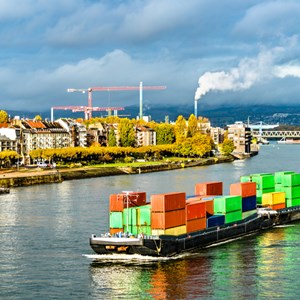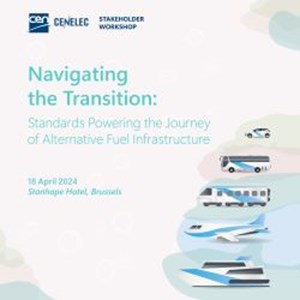NEWS

CEN and CENELEC have entered into a significant agreement with the Central Commission for the Navigation of the Rhine (CCNR) to advance the standardization of inland navigation. This collaboration aims to improve standardization processes and safety measures in inland waterway transport. It has been formalized through a Memorandum of Understanding (MoU) signed by the three organizations on 9 April.

Finding ways to use alternative fuels like electricity, biofuels, and hydrogen in transportation comes with its own set of hurdles. Imagine setting up charging stations for electric cars across Europe, ensuring airplanes use sustainable fuels, or making ships more environmentally friendly. Luckily, standards can help, as highlighted by a workshop organized by CEN and CENELEC on 18 April.

The standardization activities of CEN and CENELEC for the transport sector on interoperability and safety requirements are well known. But CEN and CENELEC are also very active in another key topic for the transport industry: the environmental impact and circularity of materials used for vehicles and transport infrastructure.

The transport of liquid chemicals and liquefied gases is a strategic activity, which impacts many sectors in our society: energy for industrial ovens and furnaces, insecticides, textile, paints, fertilizers, plastic components, medical applications, and so on.

Every day, there is an intense circulation of road and rail vehicles transporting various sensitive goods: fresh fruits, meats, flowers, vaccines, organs, medical devices, or chemicals. To be safely transported and ensure they keep their properties, these goods need to be kept at a constant controlled temperature in appropriate vehicles equipped with the necessary equipment.

The hyperloop is a new technology being developed by several companies all around the world. An innovative means of transport for large volumes of passengers and cargo, it is based on new or emerging technologies, such as low-pressure environment or magnetic levitation, that allow it to travel at very high speeds and protected from bad weather or other negative external conditions.

The transport of dangerous goods (TDG) is a field where the precision of control, measurement and event data of electronic equipment is crucial. To ensure the necessary level of precision, high-level standards are fundamental. Therefore, new EN 15969-1:2022 ‘Tanks for transport of dangerous goods - Digital interface for the data transfer between tank vehicle and with stationary facilities - Part 1: Protocol specification - Control, measurement and event data’, which addresses this need, is a welcome addition to CEN’s portfolio.

Climate change is one of today’s most urgent challenges and requires collective action. To achieve this aim, air travel is among the priority sectors to target: while its social and economic benefits are undeniable, aviation accounts for 2-3% of global CO2 emissions annually.

Intelligent Transport Systems (ITS) are a vital tool to increase safety and tackle Europe's emission and congestion problems. By applying information and communication technologies to passenger and freight transport modes alike, they can help make the way we move safer, more efficient and more sustainable.

The functioning of society depends on the transportation of goods and persons. The infrastructure required to enable transportation is built to ensure that this can happen safely and smoothly, providing specified high levels of service.